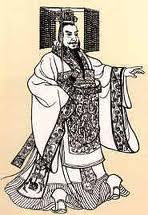 Qin Shi Huangdi
Qin Shi Huangdi, literally First Emperor
Qin, is known by many names. Ch'in
Shi Hunagti, was a common version of his title in the 20
th Century. Born
Ying Zhang, he was heir to the throne of the kingdom of Ch'in/
Qin during the Waring States period.

Through force of arms, he one by one conquered each of the independent kingdoms and in 221
BCE, created one unified empire that forever took his name Ch'in(a).
Qin Shi Huangdi not only unified the Empire, he reformed the laws and created the form of Imperial government that was to last the next 2000 years. The written language of Chinese was reworked as well. He is even credited with completion of the first Great Wall of China (at the cost of perhaps a million lives).

Today he is most famous in the West for his life size army of terra cotta warriors. Thousands of these works of art were buried to guard the tomb of the First Emperor.
>These are modern 1/3 size copies of some of the soldiers of the Qin Army.
His force of will remade China, but his dynasty barely out lived
Qin Shi Huangdi. Oppressive leadership,
ruinous taxes, palace
intrigue and his early death, in 210
BCE, left the Empire ripe for revolt. After a brief fifteen years, the
Qin Dynasty died at the hands of the Han Dynasty in 206
BCE. Short lived or not,
Qin Shi Huangdi changed forever the history of the Middle Kingdom.
 His actual title was K'ung-Fu-Tzu or literally Master Kong. In the 4th & 5 centuries BCE "Confucius developed a complex code of behavior that would guide humans, making their lives more meaningful and happier.
His actual title was K'ung-Fu-Tzu or literally Master Kong. In the 4th & 5 centuries BCE "Confucius developed a complex code of behavior that would guide humans, making their lives more meaningful and happier.











